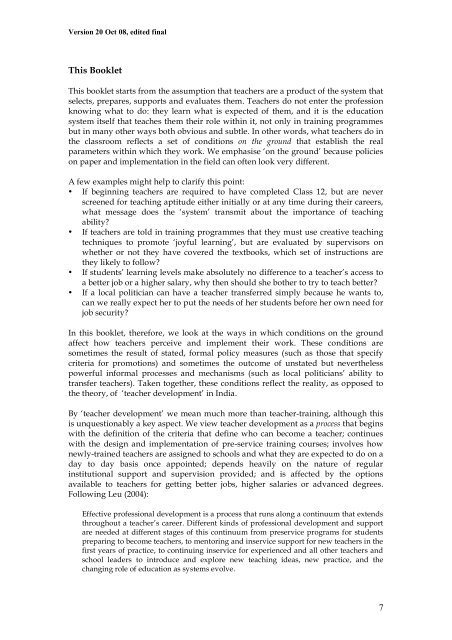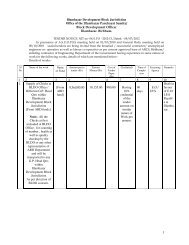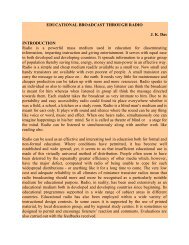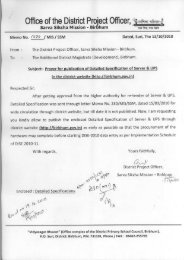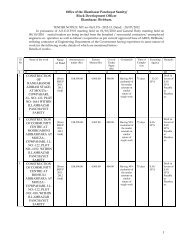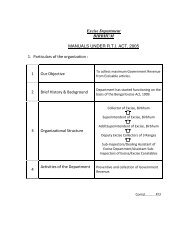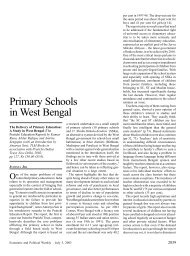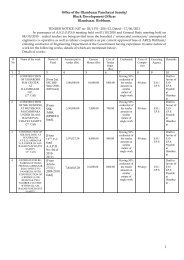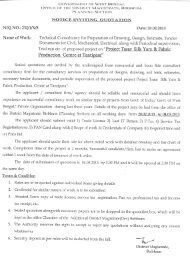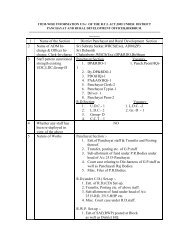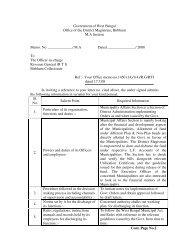Version 20 Oct 08, edited finalcountry report being under tremendous pressure from <strong>the</strong> administration to furnishreams <strong>of</strong> data through countless formats. Political leaders expect <strong>the</strong>m to lobby <strong>and</strong>campaign for <strong>the</strong>m in return for protection or favours <strong>and</strong> <strong>the</strong> district administrationexpects <strong>the</strong>m to carry out a range <strong>of</strong> administrative duties. Teachers also claim that<strong>the</strong>ir working conditions are poor <strong>and</strong> <strong>the</strong>y have to negotiate a corrupt system whereprogrammes involving mid-day meals, construction <strong>and</strong> repair <strong>of</strong> buildings,teaching-learning material (TLM) <strong>and</strong>, most importantly, teacher-training, areconverted into rent-seeking opportunities. Proponents <strong>of</strong> <strong>the</strong>se arguments say that if<strong>teachers</strong> were only left alone to do <strong>the</strong>ir jobs, <strong>the</strong>y would have <strong>the</strong> time <strong>and</strong> space<strong>the</strong>y need to dedicate to teaching.A third set <strong>of</strong> arguments, utilised most <strong>of</strong>ten by educationists <strong>and</strong> NGOs around <strong>the</strong>country who have engaged with <strong>the</strong> realities <strong>of</strong> <strong>teachers</strong> <strong>and</strong> teaching at <strong>the</strong> <strong>primary</strong>level, looks primarily at how <strong>the</strong> terms ‘teacher’ <strong>and</strong> ‘teaching’ are conceived withinour education system, <strong>and</strong> how this conceptualisation is reflected in existing systemsfor teacher-training <strong>and</strong> support. Despite <strong>the</strong> idealised vision <strong>of</strong> <strong>the</strong> teachercontained in education policy documents, <strong>the</strong> education system treats <strong>teachers</strong> aslowly recipients <strong>and</strong> implementers <strong>of</strong> instructions <strong>and</strong> content designed elsewhere,ra<strong>the</strong>r than as actively engaged participants in a creative <strong>and</strong> dynamic process.Teachers have nei<strong>the</strong>r incentives nor support to find ways <strong>of</strong> teaching better: why<strong>the</strong>n should <strong>the</strong>y bo<strong>the</strong>r? Evidence in favour <strong>of</strong> <strong>the</strong>se arguments can be found in <strong>the</strong>outcomes <strong>of</strong> innovative initiatives such as <strong>the</strong> Shiksha Karmi Project (SKP) inRajasthan, Eklavya in Madhya Pradesh (MP), Nali Kali in Karnataka <strong>and</strong> <strong>the</strong> work <strong>of</strong><strong>the</strong> Homi Bhabha Centre for Science Education (HBCSE) in Maharashtra, amongmany o<strong>the</strong>rs. These arguments emphasise <strong>the</strong> view that in order to succeed, efforts atreform must place <strong>teachers</strong> <strong>the</strong>mselves squarely in <strong>the</strong> centre <strong>of</strong> a process <strong>of</strong> analysis,design <strong>and</strong> implementation.The above discussion tries to simplify a very complex situation in order to illustrate<strong>the</strong> different ways in which to think about <strong>the</strong> issue <strong>of</strong> improving <strong>the</strong> quality <strong>of</strong>teaching in our <strong>primary</strong> <strong>school</strong>s. Is <strong>the</strong>re a ‘right answer’? How can we even begin tothink about how to improve <strong>the</strong> quality <strong>of</strong> <strong>primary</strong> <strong>school</strong>ing if we are unable toagree on a diagnosis?The Indian education system is under tremendous pressure to adapt to <strong>the</strong> growingdem<strong>and</strong> for meaningful education for all, <strong>and</strong> <strong>the</strong> teacher, <strong>the</strong> only visiblefunctionary in an o<strong>the</strong>rwise opaque system, is facing <strong>the</strong> brunt <strong>of</strong> <strong>the</strong> attack from allsides. Since 1990 <strong>the</strong> proactive role <strong>of</strong> <strong>the</strong> Government <strong>of</strong> India (GoI) for ‘Educationfor All’ has not only resulted in <strong>the</strong> introduction <strong>of</strong> a range <strong>of</strong> Central Sector Schemeswhich have pumped in financial resources for <strong>school</strong> improvement <strong>and</strong> teacherdevelopment; it has also increased <strong>the</strong> dem<strong>and</strong> for data for monitoring progress.There is no doubt that <strong>the</strong> teacher is at <strong>the</strong> receiving end <strong>and</strong> as Dr. RaghavendraChattopadhyay explains: ‘by putting unbearable pressure you harvest corruption. 1 ’An added complication is that according to recent District Information System onEducation (DISE) data (Mehta 2008) about 10 per cent <strong>of</strong> <strong>the</strong> <strong>teachers</strong> are over <strong>the</strong> age<strong>of</strong> 55 years <strong>and</strong> thus expected to retire soon. At <strong>the</strong> same time, given exp<strong>and</strong>ingenrolments as also an increasing child population, <strong>the</strong>re will soon be 24 crorechildren in <strong>the</strong> 5 to 14 years age group. India will need a huge army <strong>of</strong> <strong>teachers</strong>:some estimates put it at close to 60 lakhs only at <strong>the</strong> <strong>primary</strong> <strong>and</strong> middle <strong>school</strong>levels. Conceiving <strong>of</strong> a systemic overhaul on this scale is a daunting task.1 Interview with Dr. Raghavendra Chattopadhyay, IIM-Calcutta, Kolkata, 15 July 2008.6
Version 20 Oct 08, edited finalThis BookletThis booklet starts from <strong>the</strong> assumption that <strong>teachers</strong> are a product <strong>of</strong> <strong>the</strong> system thatselects, prepares, supports <strong>and</strong> evaluates <strong>the</strong>m. Teachers do not enter <strong>the</strong> pr<strong>of</strong>essionknowing what to do: <strong>the</strong>y learn what is expected <strong>of</strong> <strong>the</strong>m, <strong>and</strong> it is <strong>the</strong> educationsystem itself that teaches <strong>the</strong>m <strong>the</strong>ir role within it, not only in training programmesbut in many o<strong>the</strong>r ways both obvious <strong>and</strong> subtle. In o<strong>the</strong>r words, what <strong>teachers</strong> do in<strong>the</strong> classroom reflects a set <strong>of</strong> conditions on <strong>the</strong> ground that establish <strong>the</strong> realparameters within which <strong>the</strong>y work. We emphasise ‘on <strong>the</strong> ground’ because policieson paper <strong>and</strong> implementation in <strong>the</strong> field can <strong>of</strong>ten look very different.A few examples might help to clarify this point:• If beginning <strong>teachers</strong> are required to have completed Class 12, but are neverscreened for teaching aptitude ei<strong>the</strong>r initially or at any time during <strong>the</strong>ir careers,what message does <strong>the</strong> ‘system’ transmit about <strong>the</strong> importance <strong>of</strong> teachingability?• If <strong>teachers</strong> are told in training programmes that <strong>the</strong>y must use creative teachingtechniques to promote ‘joyful learning’, but are evaluated by supervisors onwhe<strong>the</strong>r or not <strong>the</strong>y have covered <strong>the</strong> textbooks, which set <strong>of</strong> instructions are<strong>the</strong>y likely to follow?• If students’ learning levels make absolutely no difference to a teacher’s access toa better job or a higher salary, why <strong>the</strong>n should she bo<strong>the</strong>r to try to teach better?• If a local politician can have a teacher transferred simply because he wants to,can we really expect her to put <strong>the</strong> needs <strong>of</strong> her students before her own need forjob security?In this booklet, <strong>the</strong>refore, we look at <strong>the</strong> ways in which conditions on <strong>the</strong> groundaffect how <strong>teachers</strong> perceive <strong>and</strong> implement <strong>the</strong>ir work. These conditions aresometimes <strong>the</strong> result <strong>of</strong> stated, formal policy measures (such as those that specifycriteria for promotions) <strong>and</strong> sometimes <strong>the</strong> outcome <strong>of</strong> unstated but never<strong>the</strong>lesspowerful informal processes <strong>and</strong> mechanisms (such as local politicians’ ability totransfer <strong>teachers</strong>). Taken toge<strong>the</strong>r, <strong>the</strong>se conditions reflect <strong>the</strong> reality, as opposed to<strong>the</strong> <strong>the</strong>ory, <strong>of</strong> ‘teacher development’ in India.By ‘teacher development’ we mean much more than teacher-training, although thisis unquestionably a key aspect. We view teacher development as a process that beginswith <strong>the</strong> definition <strong>of</strong> <strong>the</strong> criteria that define who can become a teacher; continueswith <strong>the</strong> design <strong>and</strong> implementation <strong>of</strong> pre-service training courses; involves hownewly-trained <strong>teachers</strong> are assigned to <strong>school</strong>s <strong>and</strong> what <strong>the</strong>y are expected to do on aday to day basis once appointed; depends heavily on <strong>the</strong> nature <strong>of</strong> regularinstitutional support <strong>and</strong> supervision provided; <strong>and</strong> is affected by <strong>the</strong> optionsavailable to <strong>teachers</strong> for getting better jobs, higher salaries or advanced degrees.Following Leu (2004):Effective pr<strong>of</strong>essional development is a process that runs along a continuum that extendsthroughout a teacher’s career. Different kinds <strong>of</strong> pr<strong>of</strong>essional development <strong>and</strong> supportare needed at different stages <strong>of</strong> this continuum from preservice programs for studentspreparing to become <strong>teachers</strong>, to mentoring <strong>and</strong> inservice support for new <strong>teachers</strong> in <strong>the</strong>first years <strong>of</strong> practice, to continuing inservice for experienced <strong>and</strong> all o<strong>the</strong>r <strong>teachers</strong> <strong>and</strong><strong>school</strong> leaders to introduce <strong>and</strong> explore new teaching ideas, new practice, <strong>and</strong> <strong>the</strong>changing role <strong>of</strong> education as systems evolve.7
- Page 5: Version 20 Oct 08, edited finalIWhy
- Page 9 and 10: Version 20 Oct 08, edited finalIISh
- Page 11 and 12: Version 20 Oct 08, edited finalwant
- Page 13 and 14: Version 20 Oct 08, edited finalWhy
- Page 15 and 16: Version 20 Oct 08, edited finalallo
- Page 17 and 18: Version 20 Oct 08, edited finalfor
- Page 19 and 20: Version 20 Oct 08, edited finalHeal
- Page 21 and 22: Version 20 Oct 08, edited finalcomm
- Page 23 and 24: Version 20 Oct 08, edited finalLet
- Page 25 and 26: Version 20 Oct 08, edited final(two
- Page 27 and 28: Version 20 Oct 08, edited finalThe
- Page 29 and 30: Version 20 Oct 08, edited finalIIIW
- Page 31 and 32: Version 20 Oct 08, edited finalstat
- Page 33 and 34: Version 20 Oct 08, edited finalunde
- Page 35 and 36: Version 20 Oct 08, edited final- Th
- Page 37 and 38: Version 20 Oct 08, edited finalIVBe
- Page 39 and 40: Version 20 Oct 08, edited finalOver
- Page 41 and 42: Version 20 Oct 08, edited finallate
- Page 43 and 44: Version 20 Oct 08, edited finalNotw
- Page 45 and 46: Version 20 Oct 08, edited finalwas
- Page 47 and 48: Version 20 Oct 08, edited finalacco
- Page 49 and 50: Version 20 Oct 08, edited finalscho
- Page 51 and 52: Version 20 Oct 08, edited finalVTra
- Page 53 and 54: Version 20 Oct 08, edited finalques
- Page 55 and 56: Version 20 Oct 08, edited final1994
- Page 57 and 58:
Version 20 Oct 08, edited finalimpr
- Page 59 and 60:
Version 20 Oct 08, edited finalBox
- Page 61 and 62:
Version 20 Oct 08, edited finaladmi
- Page 63 and 64:
Version 20 Oct 08, edited finalTrai
- Page 65 and 66:
Version 20 Oct 08, edited finalhelp
- Page 67 and 68:
Version 20 Oct 08, edited final(Kin
- Page 69 and 70:
Version 20 Oct 08, edited finalinst
- Page 71 and 72:
Version 20 Oct 08, edited finalfund
- Page 73 and 74:
Version 20 Oct 08, edited finalCrea
- Page 75 and 76:
Version 20 Oct 08, edited finalBIBL
- Page 77 and 78:
Version 20 Oct 08, edited finalDe,
- Page 79 and 80:
Version 20 Oct 08, edited finalGove
- Page 81 and 82:
Version 20 Oct 08, edited finalKuma
- Page 83 and 84:
Version 20 Oct 08, edited final____
- Page 85 and 86:
Version 20 Oct 08, edited finalSyno
- Page 87 and 88:
Version 20 Oct 08, edited finalSC:


